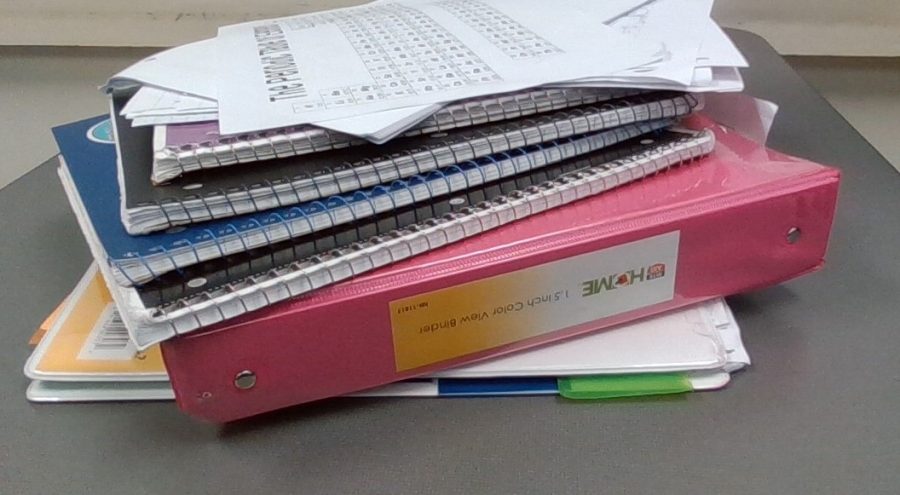Planning Key to Managing Workload Crises
A representation of all the notes, assignments, and worksheets Tao had to work through.
December 1, 2021
It might have seemed like the worst possible scenario. After a week of being locked at home with pneumonia (from October 18th to October 22nd), Sophomore, Ethan Tao (he/him) was met with piles of work, ranging from simple worksheets and assignments, to full-on Chemistry labs, a curve packet with over one hundred problems for Calculus, and a flurry of missed tests.
This scenario is typical of missing school for many students. Fortunately, Tao’s teachers were there to support him all the way through.
In an interview, Tao stated, “most teachers didn’t give a specific due date, and if they did, I could ask for an extension if I needed, and they’d say ‘that’s perfectly fine.” As for the rest of the teachers, they just wanted his work by the end of the nine weeks.
Tao was surprised at the flexibility of his teachers, and also reported that they took the difficult scenario that Tao was placed in into account before setting guidelines on his assignments.
The leniency of his teachers made it much easier for Tao to move on to the next part of the procedure–figuring out a strategy for tackling the workload.
The first order of business for Tao was to have all of his missed assignments written down. After that, he reported, “I’d just look at the list and see, ‘what’s my priority?”
His methodology for determining his priorities was to consider two factors. One was to see how long it would take to complete, and the other was to see when it actually had to be completed (or in the case of a test, when it would occur for him).
With all the preparation out of the way, Tao was ready to start delving into the long list of tasks.
He described his ongoing experience as stressful, and there were times where he would look at his paper and think, “that’s a lot of work, I don’t know how I’m gonna get this done.” However, the schedule and plan he organized led him to realize that the massive workload was actually more manageable than he first anticipated.
The overall experience led Tao to become more prepared for any potential missed school days in the future.
According to Tao, the biggest takeaway for him was that there really wasn’t any point in “stressing out about it,” and to just “take it all in one by one.”
Despite pushing through with a solid strategy, Tao still had one aspect of the situation in mind that he would have liked to change if he had the choice–the time constraint.
Because the first quarter of the school year was nearing its end, some of Tao’s teachers preferred that he completed his assignments before said deadline. The main issue was the fact that after submitting the grades for a quarter, they could not be edited until several weeks later. Tao suggested that if the school had the ability to do so, they could adjust the system so that grades could be kept editable at all times.
Sophomore student Ethan Tao got quite an unlucky roll of the dice when pneumonia prevented him from attending school, leaving him with an indescribable amount of work. But with a well-crafted plan, and communication with his mentors, he found his way to success.
Tao said he was ultimately left a very valuable reminder: “People aren’t monsters you know? So they’ll be lenient.”













Dale Morris • Jan 3, 2022 at 10:25 am
You miss more you must turn the work in
Anonymous • Dec 27, 2021 at 10:28 pm
Really good piece, Sunny! However, when writing, stay consistent with what you are saying and don’t contradict yourself; you originally described Tao’s many incomplete assignment but then concluded the article by saying he had “an indescribable amount of work.” Avoiding this mistake will steer you away from discrepancies in writing as well as increase your reliability as a journalist. I only intend this to be constructive criticism! Keep up the great work.